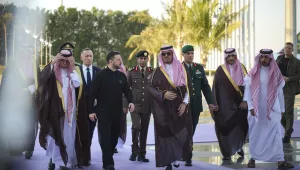BEIRUT -- The admission by Lebanese Prime Minister Saad Hariri Monday that he and his allies made a mistake in their politically motivated accusation that Syria had killed his father Rafik Hariri in February 2005 is startling and dramatic -- but only its timing was a surprise, not its substance. It marks a peak to a political process that has been underway for a year in the short term, and for some 4000 years in the longer historical perspective.
In the short-term, it represents the difficult political transition that sees Lebanon seeking to achieve two difficult and perhaps impossible balancing acts. The first is to balance justice and stability -- the urgent need for justice in identifying and judicially holding accountable those people, organizations or governments that will be indicted for the murder of Rafik Hariri and 22 others, alongside the equal imperative of maintaining calm, stability and economic growth that could be wildly ravaged by violence if the indictments trigger new murders, bombings, political deadlock and sectarian fighting.
The second balancing act is between sovereignty and national self-interest -- the ancient dynamic between the demographic weight and strategic geography of Lebanon and Syria, which since the 3rd Millennium BC has been structurally defined by serious Syrian influence or occasional direct control over much of what constitutes the modern state of Lebanon.
Hariri’s calling the accusations against Syria a mistake will be questioned and resented by many. His admission that they were politically motivated will not, because the whole assault on Syria in February-June 2005 was highly politically driven, reflecting a momentary convergence between two powerful forces: deep and widespread resentment against Syria in much of Lebanon for its dominance of the country over nearly three decades, and an American-led international desire to pressure and even break the ruling powers in Damascus for many reasons.
Syria adjusted to this combination of forces against it by withdrawing from Lebanon and hunkering down to withstand and actively resist the international political assault against it. The regional configuration has changed radically in the past five years, and Syria feels it has reasserted itself as the indispensable player that has structural links with, and must be consulted on, every major issue and actor in the area, including Lebanon, Iraq, Iran, Palestine, Israel, Hizbullah, Hamas, Turkey, and Saudi Arabia. It seems only natural that bilateral ties with Lebanon would be adjusted in due course, as has been happening during the past year. Saad Hariri, as both a son seeking justice for the murder of his father and a prime minister seeking the security and wellbeing of all Lebanese, is putting into practice the need to forge relations with Syria that are marked less by explicit animosity and more by negotiating mutually acceptable ties based inevitably on the structural historical imbalance of power and influence between Beirut and Damascus.
A generous interpretation would see this as a sign of maturity, realism, pragmatism and real statesmanship on Hariri’s part. A less generous view would see only cowardly capitulation by a fractured and dysfunctional Lebanese political system to a more aggressive and focused Syrian one.
Hariri has no easy choices, because Lebanon has little or no leverage in this dynamic. His interview Monday retracted the political accusations against Syria, but did not totally reverse the political process that remains underway in the form of the Special Tribunal for Lebanon (STL) that will soon use its available evidence to indict those people it believes killed Rafik Hariri. The vexing issue of how a heavily armed Hizbullah and the Lebanese state and government coexist remains high as national priorities, and will become more difficult if STL indictments finger Hizbullah in some manner. The possibility of really hard times are still ahead.
Saad Hariri quietly struck a third and very important balance, though, between the political and the judicial, when he said, ''I don't know what will be in the indictment and I cannot intervene in that, nobody can. All that I ask for is the truth and justice.''
The best approach all along has been to go easy on political emotion and instead heighten the credibility and independence of the STL process. A strong, evidence-based, indictment by the STL will generate powerful support in Lebanon and globally, and isolate those who fear being exposed for their involvement in the serial assassinations.
All Lebanese want dearly to identify and hold accountable the killers in their midst. The center of gravity of this process now shifts towards the STL, as Lebanese-Syrian relations revert to their historical norms -- for now under the umbrella of Syrian-Saudi cooperation -- alongside lessened international pressure against Syria, an American retreat from a convulsing Iraq, and more attention to Iran’s nuclear and political ambitions. In such a complex and ever-changing regional power picture, small states like Lebanon can only adjust to regional power flows, not shape them.
Rami G. Khouri is Editor-at-large of The Daily Star, and Director of the Issam Fares Institute for Public Policy and International Affairs at the American University of Beirut, in Beirut, Lebanon.
Khouri, Rami. “Lebanon Adjusts to Regional Realities.” Agence Global, September 28, 2010




